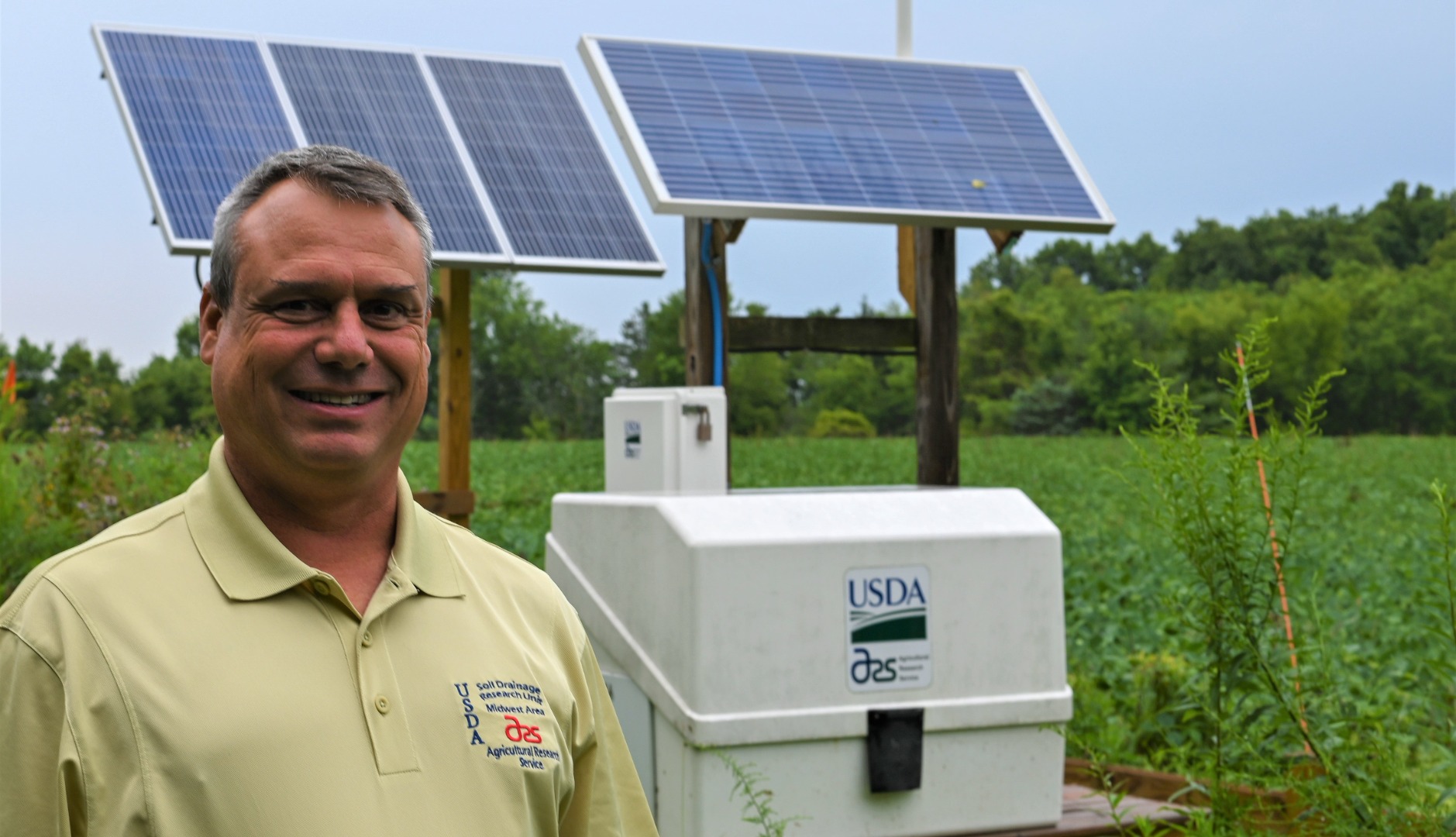| Kevin King |

|

Position Description
Dr. Kevin King is a Supervisory Agricultural Engineer, Research Leader, and Lead Scientist with the Soil Drainage Research Unit (SDRU), Columbus, OH. As Research Leader, responsibilities include enhancing creativity and productivity; providing technical leadership and supervision; managing fiscal and physical resources; and ensuring proper reporting of research results. Dr. King provides leadership to an interdisciplinary team of engineers and scientists studying the complex, natural resource interactions of implementing standard and novel conservation practices and their impact on soil and water quality.
Dr. King has immediate responsibility for the hydrologic and water quality aspects of the interdisciplinary research including selection of conservation management practices to be tested; identifying and securing field and watershed test sites; data collection procedures, methods, and technologies; determining modeling approaches; and publishing and presenting the research findings.
The research impacts ARS national programs and Natural Resource Conservation Service (NRCS) conservation programs. It is integral to the NRCS Conservation Effects Assessment Project – Watershed Assessment Study (CEAP-WAS) and ARS’s Long-Term Agroecosystem Research (LTAR) program. Dr. King serves as national field lead/coordinator for CEAP as well as the site lead for the Columbus, OH CEAP location. He also serves as site lead for the Eastern Corn Belt node of LTAR.
When time permits, Dr. King enjoys spending time with family, playing golf, fishing, cooking, and reading.
Education
Texas A&M University, College Station, TX
Ph.D. Civil Engineering, 2000
Dissertation Title: Model Development and Data Collection for Whole Turfgrass Systems
Purdue University, West Lafayette, IN
M.S. Agricultural Engineering, 1992
Thesis Title: Comparison of Rill Erodibility Parameters as Influenced by Long-Term No-Till Farming
Purdue University, West Lafayette, IN
B.S. Agricultural Engineering, 1991
Experience
USDA-ARS, Soil Drainage Research unit, Columbus, OH
Research Leader, 2015-Present
- Provides scientific, visioning, fiscal, and informational leadership to an interdisciplinary team of engineers and scientists studying the complex, natural resource interactions between agricultural crop production management and environmental indicators across the field to stream continuum.
Research Agricultural Engineer, 2002-Present
- Measures and quantifies the effects of innovative conservation practices, source water protection practices, and land use management on surface and subsurface tile drainage water quality, water quantity, and lotic ecosystems at the field, farm, and watershed scales.
- Develops and validates watershed scale water quality models and quantifies the uncertainties of model predictions at field, farm, and watershed scales.
- Assessed and characterized the environmental aspects of urban and golf course turf, including the development and evaluation of management strategies or technologies to mitigate the potential offsite transport of sediment, nutrients, and pesticides.
USDA-ARS, Grassland Soil and Water Research Center, Temple, TX
Agricultural Engineer, 1997-2002
- Developed models for optimizing the use of fertilizers, water tillage, pesticides, and other inputs for crop production at the field and watershed scales containing both traditional agricultural and turfgrass systems.
- Developed improved soil, water, and crop management practices for controlling runoff and erosion, protecting water quality, minimizing soil compaction, and restoring or maintaining the productivity of crop and rangelands.
- Determined the impact of traditional and urban agricultural system management alternatives on fertilizer use efficiency, nutrient cycling, organic matter buildup, and atmospheric CO2 capture.
Hydraulic Engineer, 1995-1997
- Provided instrumentation setup and maintenance for USDA-ARS hydrologic watersheds located at Riesel, TX
- Designed, setup, and managed a database for historical hydrologic data from agricultural watersheds in Riesel, TX
- Worked as liaison for cooperative modeling work between Mexican National Government and ARS Temple, TX
- Taught workshops in the use of computer models for managing and protecting natural resources
- Supported EPIC and SWAT modeling development and validation efforts
- Maintained and supported the GLEAMS field-scale loading model
Blackland Research Center, Texas Agricultural Experiment Station, Temple, TX
Associate Research Scientist / Agricultural Engineer, 1993-1995
- Incorporated and validated global climate change routines from EPIC field scale model into SWAT
- Maintained and supported the GLEAMS field-scale loading model
- Assisted in technology transfer of GLEAMS water quality model to Soil Conservation Service (SCS)
USDA-ARS, National Erosion Research Laboratory, West Lafayette, IN
Agricultural Engineer 1989-1993
- Completed experimental research, planning, and analysis of field study for determination of erodibility values for long- term no-till farming in support of the WEPP model development
- Aided in development and procedures for a method of measuring overland flow velocity
- Accomplished experimental research and analysis of water quality on infiltration, runoff, and erosion
- Performed a sediment transport analysis in preparation for graduate student's Ph.D. dissertation
- Developed, assembled, and calibrated a rainfall simulator
Family Farm, Franklin, KY
- Co-Managed and maintained a 30+ acre dark and burley tobacco operation
- Co-Operated a 100+ sow hog operation and 100+ head beef cow operation
Accomplishments
- Led the Unit’s expansion and capacity building to conduct high priority CEAP, LTAR, and Western Lake Erie Basin (WLEB) research.
- Assessed and quantified hydrologic, water quality, and ecologic impacts of implementing innovative conservation programs and practices.
- Revealed the significance of tile drainage to headwater hydrology and phosphorus transport.
- Identified key controls and processes governing nutrient transport in tile drained landscapes.
- Evaluated and enhanced field and watershed scale hydrology and water quality simulation technologies.
- Provided the only available long-term watershed-scale data and interpretations between agronomic practices and water quality on managed turf.
- Developed procedures and protocols for edge-of-field (EOF) monitoring installation and water quality sampling.
- Advanced the understanding of hydrologic relationships for the semi-arid Blackland Prairie region.
Click here to view Google Scholar entries for Kevin King in a new tab
